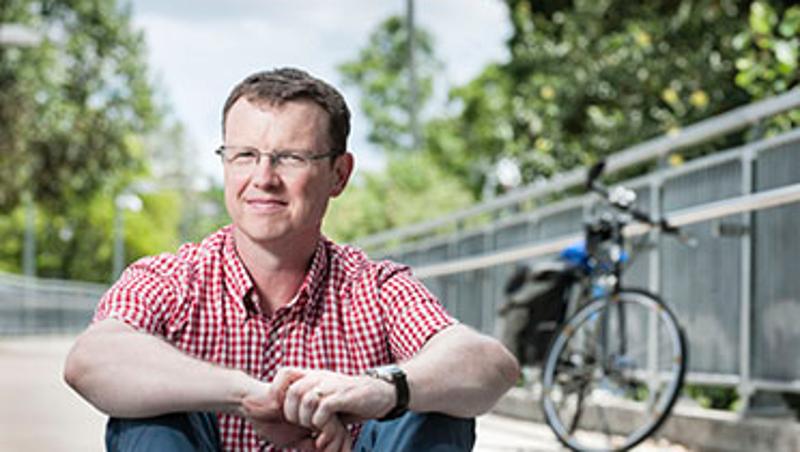
A QUT health statistician is urging Australian policy makers to provide more incentives for motorists to use alternative transport.
In a paper published in the journal Environment International, Associate Professor Adrian Barnett examined the relationship between petrol and diesel prices in Brisbane and traffic pollution levels in the 16 days after changes in fuel prices.
He found higher petrol prices had no effect on pollution levels but higher diesel prices led to significant short-term reductions in carbon monoxide and nitrogen oxides in Brisbane's air.
When diesel prices were at their peak, nitrogen oxide levels were about 30 per cent lower and carbon monoxide levels 70 per cent lower than when diesel prices were at their lowest.
"Pollution is something people tend to overlook but price is something everyone understands - and most Australians are sensitive to fuel prices," said Professor Barnett, from QUT's Institute for Health and Biomedical Innovation.
"Diesel vehicles make up only 20 per cent of vehicles on Brisbane roads but often create more pollution than petrol vehicles.
"Many privately owned diesel cars and four-wheel drives are old, inefficient and therefore dirtier. Owners of these types of vehicles would likely feel the pinch more when prices are high and make a conscious effort to use those vehicles less."
Last year the World Health Organization declared diesel exhaust fumes as a known carcinogen, as harmful to your health as smoking cigarettes.
Modelling the pollution and fuel price data, Professor Barnett estimated that increasing Australia's federal tax on diesel fuel from the current 38 cents a litre to 53 cents would reduce overall daily carbon monoxide levels by 40 per cent and nitrogen oxides by 17 per cent.
That in turn would reduce daily hospital admissions by two per cent in Brisbane - the equivalent of 200 adults and 15 children admitted to hospital every year.
"While higher petrol prices are bad news for most, they are good news for people with asthma, cardiovascular disease, the elderly and pregnant women - all of who are all at risk of becoming ill after exposure to air pollution," Professor Barnett said.
While Professor Barnett's findings imply that tax increases on diesel fuel could be used as a public health measure, he has cautioned against policy makers using higher taxes to discourage diesel vehicles like they have used taxes to discourage smoking.
"Traffic pollution and cigarette smoking are similar - many of the chemicals involved are the same, they both take the same pathway into the body and they both lead to the same kind of diseases and poor birth outcomes," he said.
"However, as the carbon tax debate has clearly shown, raising taxes is a highly unpopular solution, particularly when applied to something so many of us rely on daily - our vehicle use.
Professor Barnett said, rather than penalising people for undesirable behaviours, in this case driving, governments could provide incentives for people to cycle more, use public transport or buy hybrid or electric cars.
"Smart governments looking to tackle pollution would be better off offering incentives to reduce the number of vehicles on the road," he said.
"In fact, policies aimed at reducing air pollution could very well pay for themselves in reduced health costs.
"Italy, the UK and the Netherlands all offer tax deductions for using bicycles to commute, and in some countries employers pay their staff to cycle to work rather than drive.
"As a country and a global community we should be concentrating on reducing air pollution levels in the long term rather than price pressure to snatch a short-term fix."
Professor Barnett co-authored his paper with Dr Luke Knibbs of The University of Queensland.
The paper is available from the Science Direct website.
Media contacts:
Kate Haggman, QUT Media, 3138 0358 or kate.haggman@qut.edu.au
After hoyrs rose Trapnell 0407 585 901


